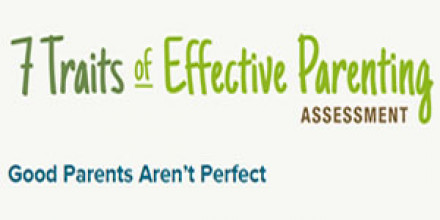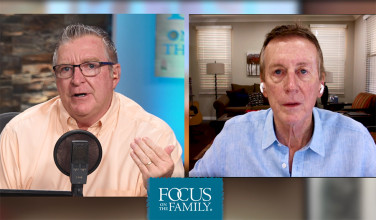Excerpt:
Dr. John Townsend: But when you say, “Here’s what we – our picture of the house and how it functions – time, money, schedule, clean up, cooking, chores.” And the adult child puts theirs out there, then you just say, “OK, where can we give and take?” It becomes a very nice negotiation.
End of Excerpt
John Fuller: That’s Dr. John Townsend and he offers hope for some of the challenges of having an adult son or daughter move in and live with you, perhaps unexpectedly. A lot of that happening these days with the pandemic. This is Focus on the Family with your host, Jim Daly. I’m John Fuller. And today we’re going to be talking about that situation as you try to navigate more people in your home and less freedom to deal with it all.
Jim Daly: (Laughter) Less freedom. I love it. John, it’s so true. This crisis has led to some real challenges that have come on suddenly and unexpectedly. I mean, we haven’t planned this and all of a sudden you’re getting a phone call from your college or vocational young adults saying, “Hey, Mom, Dad, I’m in some trouble. Can I come back to the house till this thing clears up?” And of course, we’re saying yes because this is so odd and such a unique environment for everyone. And we’ve experienced that with Trent. Trent came back from his first year of college. He’s about 30 miles from us. But it was great to have him back. And we had – there were little challenges, but really nothing big. And more and more people are experiencing that. I think, John, you’ve had some of that, too, right?
John F.: We had – we’ve had a revolving door.
(Laughter)
John F.: They all seem to come back for a season and it’s never bad. But we’re going to be talking about some things about how you should deal with this, because it is – it can’t be difficult at times. There can be tension.
Jim: And with a great guest.
John F.: Yeah. Yeah. We’ve got Dr. John Townsend, who is a clinical psychologist, a marriage and family therapist. He’s an author, a business consultant. He does a lot of stuff and is the founder of the Townsend Institute for Leadership and Counseling. Uh, he and Dr. Henry Cloud have written a terrific book called Boundaries: When to Say Yes, How to Say No to take Control of Your Life. And it’s going to have a ton of application to our conversation today.
Jim: Well, I think most importantly, he is a good friend. And it’s wonderful to welcome Dr. John Townsend. John, welcome back to Focus.
John T.: Glad to be here, guys.
Jim: I think it’s been over a dozen times that you’ve been on Focus on the Family, somewhere around there. So, we’ve had such great conversations over the years. Now, I think a bunch of people just either turned the YouTube up or turned the radio up or their app. “You’re going gonna give me some handle on developing boundaries for my young adults who I’ve now lived with for the last six to eight weeks who are driving me crazy?”
(Laughter)
Jim: What’s the secret, John?
John T.: Well, the secret is – you’re also driving them crazy, Jim, so it’s a two-way street on this deal.
Jim: (Laughter) That is – that is so true.
John T.: When you look at this, guys, you have to realize the first thing is that because of what’s happened, and like you said, they’re, you know – they’re losing jobs and they can’t be in school and they’re coming back as adults. Basically, what we have happening is a reversal, a temporary reversal, of God’s entire created order.
Jim: Huh.
John T.: Because when you look at Genesis 2, it says, what do you do? You know, well, when you get old enough to get out there and be autonomous, you leave and cleave, and you find your own mate and social system and career and passion. All of a sudden, the brakes on that stuff, and somebody who had these dreams to get out there, find their way, find their own, you know, way to express passion and express meaning, I got to come back to my bunker room, you know, with my bunk bed, with my little brother…
Jim: (Laughter)
John T.: …In the bottom of it? (laughter) And so, the reversal of the created order creates a tension in itself.
Jim: Yeah. You know, I’ll share the story with Trent, because it just happened last night. Jean and I gave him a big hug because he went back to his apartment last night. And we were very sincere with it because it has been an incredible time for us. And I know that’s…
John T.: Hmm.
Jim: …Not true for everybody and – and we want to get to those hard things. But I think in many ways, even with the pebbles that were in the path, you know, not rinsing out your cereal bowl…
John T.: Yeah.
Jim: …Which drives me crazy when the Wheaties get caked on to the side of the bowl.
John T.: (Laughter).
Jim: But, uh, you know, it’s silly little things like that. But, you know, last night hugging him and just saying, “It has been so great to have you here the last six to eight weeks. It’s been so much fun…”
John T.: Mm hmm.
Jim: “…Playing board games and just relating to each other in a different way.” And I think we did a fairly good job of backing off. We didn’t have a lot of rules. We didn’t reimpose a curfew or anything like that.
John T.: Mm hmm.
Jim: And he, you know, he – he did a lot of independent things. But here’s the blessing. And every mom is going to appreciate this. So, yesterday we – Jean and I were out of the house for a few hours. He went through, he cleaned the bed and bathroom that he had used. He did the linens. He did all – made the bed, filled the bird feeder out in the backyard, watered the lawns for me. All within about…
John T.: Oh.
Jim: …Four hours. And I didn’t know until, you know, he had left after hugging him because he was driving out as we were driving in. And it was probably the best gift he could have given, Jean for sure. She was just so like, “Oh, that was awesome. It all worked.”
John F.: (Laughter)
Jim: “Look, everything we’ve taught him has finally sunk in. He put it all together for the first time.”
(Laughter)
Jim: But she was really blessed. And that was a great ending to our shelter-in-place experience with him.
John T.: Well, think about what just happened with Trent, guys. It wasn’t that all of a sudden, he got his act together. Really, it’s because all those years of what the Bible calls the “admonishment and nurturance of the Lord” that you guys did…
Jim: Hmm.
John T.: …Is paid off. And he was probably doing a lot of those things in his own apartment. But those – you were investing, investing, investing and now what he’s showing you is, thank you. It worked.
Jim: I got it. Right.
John T.: So, it’s many years of you guys being – I’ve got. I got it.
(Laughter)
Jim: And he’s been telling us that, but we’re not always believing it. (Laughter)
John T.: Well – well – but – well, don’t drop by his apartment and surprise him. He might not…
(Laughter)
Jim: But it’s just – that’s a good thing. And it is – it – John, it’s this thing that you and Dr. Cloud talk about. It’s letting go. And I think in the Christian community, particularly, it’s hard for us as moms and dads – that we’ve established a lot of boundaries, a lot of rules. You know, we go to church on Sunday. Of course, we tell the truth. We want to know how you’re doing. And heaven forbid something should go wrong, like drug addiction or alcohol addiction. But Christian parenting puts a lot of demands on kids and…
John T.: It does.
Jim: …You’ve got to be able at some point to say, “It’s yours.”
John T.: You do. Even within the confines. You know, when you look at the, uh – the research – most of what I study now is neuroscience because it bad it basically affirms that the Bible’s true. All the great studies about relationship and challenge and resilience and families, they basically said, “God had it right the first time with all the things that He does.” When you see it, it comes down, especially in this crisis with the kids coming home, two things that every parents got to grapple with. The first is relationship and the second is structure.
Jim: Yeah.
John T.: And the more mature your – your adult child is, the less structure you need. You said it at the beginning of the show, Jim. You went, “Well, we didn’t have a whole lot of rules.” Well, that means that Trent is mature enough that he’s internalized the structure so, you do not have to provide the external structure.
Jim: Yeah, it’s true.
John T.: If you have an adult child that doesn’t have a lot of structure – maybe they’re impulsive or they’re not organized or maybe immature. Then relationship is still there, but structure has to increase.
Jim: But, you know, John, what’s so hard and I’ll – again, I’ll use my own experience. And you know, we’ve had our issues. I don’t want people to say, “You know, it’s Jim Daly. Of course, everything went well.” No, we’ve had struggles, too. And that’s why Focus is here. Listen, we want to help you in your parenting journey, of course. And we’ve had to rely on that help as well and – but at the same time, there is this dynamic where probably when he was a junior, late in his junior year, and we talked to a counselor and we talked to them about how do we let go.
John T.: Hmm.
Jim: And it was hard for Jean particularly, but me, too. And how we opened our hand up and not ride him all the time. And I’m telling you, John, and I’d love your opinion about this. I mean, like, as soon as we did that, he turned toward us and began…
John T.: Right.
Jim: …To exhibit far better behavior and it was like it really was amazing. But that’s kind of what you guys talk about, right?
John T.: Absolute. One of the things we talk about in Boundaries a lot is that the scariest thing – like I wrote a book called Boundaries with Teens, talking about that passage of life and what you’ve got to have is you’ve got to start with love and then you got to say, “Here’s the truth. Here’s our ground rules.” And then you’ve got to give freedom to break the ground rules. Then you’ve got to have consequences if you break that. Well, if – of those four, the scariest one for a Christian parent is guess what? It’s freedom.
Jim: Right.
John T.: Wait a minute. You might do something wrong. You might act out and you say, “Yeah. Now, you don’t say to a 3-year-old, go play in traffic to have freedom.” That’s silly. You go out and save your child. But at a certain age where you’ve got to allow that child to break the boundaries, to experience the consequences of breaking them, follow through with reasonable boundaries and then they learn. And if they never had that freedom to sort of push against the rules, they’ve become what we call it in psychology an over-compliant child who grows up and blows up later in life.
Jim: Right. And that’s not what you’re aiming for. You certainly don’t want that. Well, let’s get down to some basics, John. How do we improve communications with our adult-returning, almost-launched (laughter)…
John T.: Yeah.
Jim: …Young person? What are some things in the communication area that we can make sure that they’re perceiving, “Oh, our relationship is different. It’s not the same. There is something good and different about how mom and dad are communicating with me”?
John T.: Yeah. This one is going to be hard one, but if Christians parents can stomach this one, it’ll really, really work.
Jim: (Laughter).
John T.: You sit down – as soon as you hear this show – or I guess it’s see this show now, right?
Jim: Or both of it. Yeah.
John T.: Or both – seeing or hearing. Soon as you experience this show, you call a meeting with your adult kids and say, “Guys, I just learned something. I’m retiring as a parent. I’m no longer a parent. God made me a parent for a season and I’ll always be your mentor and love you and support everything you do. But a parent in terms of having, uh – being your source of – of life and making decisions and being your number one support system and all that. I want to be that older friend that you’ve got a history with. And yet it’s my house, so I’m in charge of it. But I want to be a peer to you, an older peer, and love you, but I’m not taking authority over you. It’s – that’s done because you left home. And I’m so proud of you. And now we’ve got an arrangement. But I don’t want to parent you anymore.”
Jim: Hmm.
John T.: Well, let me tell you what that does to the…
Jim: That is good.
John T.: It’s hard. It’s hard. I’ll tell you what the child does. And I have seen that happen 100% of the time. The adult child goes, “What?”
(Laughter)
John T.: And you say, “Yeah. I’m not going to tell you about curfew. Now, I do have rules about the Wheaties. You can’t do this…”
Jim: (Laughter).
John T.: “…And you can’t spend money. You can’t do bad habits because it’s my house – just because you’re a tenant. You’re a boarder. But I’m not – just like when you left home, I didn’t check on you twice a week and text you and say, ‘Did you go to your job? Did you wash your socks?’ I’m going to treat you the same way here. I’ve got house rules, but I’m not functioning as your guide all the way through life anymore.” And they love it. And they go…
Jim: Right.
John T.: …And just like Trent, they’ll go, “I can make decisions because they’re right for me. I can make decisions because I’m a grown up. I’m getting respected here.” And they turn up. Now, it they fail that, they start doing bad things, you got to say, “We’ve got to have some rules here, guys.” But I always start with that freedom.
Jim: Right. That’s good stuff.
John F: Some practical advice from Dr. John Townsend on today’s episode of Focus on the Family with your host, Jim Daly. We do have copies of this terrific book, Boundaries: When to Say Yes, How to Say No to take Control of Your Life. Look for that online or give us a call. Our number is 800, the letter A and the word FAMILY. And our website is focusonthefamily.com/broadcast.
Jim: John, I’m kind of running through my checklist here. So, we’ve got communication down. I think we covered that one really well. The other one is how to respect their autonomy when they come home. That’s a another hard one. (laughter) You know, they’ve probably rightfully want to have some boundaries, too, right? “I’m an adult.”
John T.: Mm hmm.
Jim: “I’m twenty something.”
John T.: Mm hmm.
Jim: “Although I’m in a bad spot, thank you, Mom and Dad for being a great backstop.”
John T.: Mm hmm.
Jim: “We still need some boundaries.” So, how do we, as the parents, respect that autonomy that rightfully they should have as adults?
John T.: I call it “cards on the table,” Jim.
Jim: (Laughter).
John T.: When they come in you welcome them and if they’ve been in for six months, you just say, I’m going to – “Hey, we’ve never have – we’d never had a formal talk about our arrangements. I want to have it.” So, either right when you’re coming in or, hey, I want to do kind of a pivot here and you put the cards on the table. And it’s like a corporate meeting. You say, “Here’s the way I want the home to look. Love. People being a team. People having freedom. People being able to come and go within the confines. And Jim or Sally, what do you want?” They put their cards on the table. And you’ll find, most of them, will say they kind of want the same things you do. “I need my space by myself. You’re not going to come check my room?” “No, I’m not going to check your room.”
Jim: (Laughter).
John T.: Um, and all this, and so, what they mainly say is, “I want freedom of time. I want freedom of being alone when I need to. And I also want to be with you guys.” And so, the house works out. OK, do we have meals together? And I think that you should have most of your meals together unless somebodies got some graveyard shift job or whatever. But when you say, “Here’s what we – our picture of the house and how it functions – time, money, schedule, clean up, cooking, chores.” And the adult child puts theirs out there, then you just say, “OK, where can we give and take?” It becomes a very nice negotiation.
Jim: Yeah, that is good. John, I’m turning John Fuller. How’s it going in your house?
John F.: (Laughter) Yes. Well, one thing we found out – and I want to ask John about this. One thing we found out is that formal talk, um, sometimes we’ve had it and other times we haven’t. And I’ve even written up some kind of understanding, you know, documents of mutual understanding…
Jim: (Laughter).
John F.: …But they were all in my head or on my page of paper. We never had the conversation. So, it’s pretty awkward after several months to say, you know, “We didn’t ever talk about how long you could stay…”
John T.: (Laughter).
John F.: “…Or about rent or any of that.” So…
Jim: What about the pet? Bringing the pet back.
John F.: Yeah. Well, we had…
John T.: (Laughter).
John F.: …We had one daughter move back home with a dog. And it’s sort of like, “OK, I now have two dogs. I really didn’t want to. I just wanted my dog.”
(Laughter).
John F.: And then another daughter who got a dog given to her and she’s like, “Please!” And it’s like, “Well, I can’t say no to you. So…”
Jim: You got three dogs?
John F.: Now I have three dogs. And we had a robo-vac incident the other day.
(Laughter)
John F.: That is just unpleasant. So how do you – how do you get back into those conversations that never happened?
John T.: John, I want to have a reality TV camera at your house.
(Laughter)
John T.: I think that’d be the best entertainment I can imagine…
Jim: That’s pretty funny. But yeah, I guess that’s a great point, when the kids are moving back home, you know, they’ve got baggage sort of speak.
John T.: Yeah.
Jim: For the pet lovers, I mean, it’s not seen that way. But yeah, they’ve got their own responsibilities like an animal that they’re going to bring home. This sounds so trivial, but it could become a real problem.
John T.: Yeah. Well, first off, John, um, in terms of your “Well, I had it in my head and my paper to talk about it.” It’s not weird to say now I’ve got to talk about. I would just own it as a parent and say, “You know, guys, we’ve been kind of living organically here and we love each other, but, you know, there’s also structure and structure is just as important relationship – almost as important as relationship. So, can we have a family meeting?” Most the time the kids will go, “Yeah. ‘Cause, Dad, I got to gripe about you. You’re a micromanager.”
(Laughter)
John T.: And so, you know, you get it out on the table and – and reasonable people that love each other work out the problems. And so, what I would do is say, “OK, a little bit late on this, but let’s do it.” And you’ll find that they kind of go it’s kind of nice to have clarity. When you look at neuroscience, guys, the brain loves clarity. It loves to know where the hooks are. And when we don’t have it, because we think love – what did the Beatles say? “Love is all you need.” Nope. Sorry, John and Paul, it’s not all you need. You also need structure. Then people relax and go, “Oh, I know some basic house rules.” They’re not really obsessive, controlled rigid house rules, but they’re house rules that I’m comfortable with. We need structure.
Jim: No, that’s good.
John F.: Yeah. I think another aspect that we’re dealing with is, um, just kind of the space is invaded. We – we had almost an empty nest situation and now we don’t…
John T.: Yeah.
John F.: …Anymore. And we love having our kids with us. But there are these little minor irritations both ways.
John T.: Mm hmm.
John F.: And we feel ours, of course, about, as Jim was saying, the dishwasher not being loaded, or the dishes, you know, not being taken care of.
John T.: Mm hmm.
John F.: Those are small things, but they start to add up. So, what’s some…
John T.: Yep. They add up.
John F.: …Godly counsel for parents who are holding onto the little things, because you know what? It’s my house.
Jim: (Laughter).
John T.: It – but it’s true. Not in a mean way. It’s really true. And there needs to be respect. I mean, we’re not helping our adult kids by not having and talking about enforcing house rules. We’re not helping them when they go back to God’s created order by thinking that they can treat other people’s things like that. So, we’ve got to help them stay adults just for their own lives and jobs and churches. So, what I always say is when you start to notice the little things, you have to increase the frequency of your meetings. You know, most companies have a thing called like “the daily check-in.” Everybody gets on the intercom – and I’m sure Jim does it. Okay, here’s our ten minute “How’s it going?” At the beginning a day or end of the day and everybody says, “Oh, this works great. Oh, you squeeze the toothpaste out instead of -” What’s the other thing? “Rolling it.”
Jim: (Laughter).
John T.: And so, you – what you do, you increase the number of meetings, five-minute, ten-minute family meeting. And here’s the beauty of that, guys. It keeps it with the misdemeanors before the misdemeanors become felonies. Emotional felonies.
Jim: Wow.
John T.: It nips them in the bud.
Jim: Well, that is a really good word picture. I hadn’t thought about that. Hey, John, the practical idea here, um, how do we go about setting boundaries if we – and this cuts to my heart because I tend to be a little less boundary-oriented. Like they’ll figure it out. And this can be an issue between Jean and I because she’s more structured than I am. And that’s a good thing and it shows you how two people coming together complete each other.
John T.: Mm hmm.
Jim: Sometimes you want to (laughter) go after each other because of that. But in that context, how do you go about recognizing boundaries, setting boundaries, where maybe you’ve been pretty lax, even?
John T.: Yeah. And every parent’s got to kind of figure this out on their own what’s called the (unintelligible) between the mom and dad. But it comes down to a couple of things. One is the severity of the thing. How big is it? I mean, if it’s sort of like their voice is too loud. Well, is this something you talk about?
Jim: Right.
John T.: That’s not severe. If somebody is like, you know, smoking dope. Well, no, that’s severe. So, is this level severity? Well, the second thing is it’s the repetition. A one-time thing – I don’t bring things up one time, because Proverbs says, “It’s a glory to a person to overlook an offense.” It doesn’t say it’s a glory to a person overlook a pattern. Now, a pattern in my book is three times or more. So, if this thing that’s irritating and kind of like not showing respect from the house is severe enough to talk about, and it’s happened three times or more, the third thing is what how does it impact the flow of life? Does it impact people? If people say, “It doesn’t bother any of us.” Then maybe mom or dad is a little oversensitive, then you work it out. But everybody goes, “Yeah. The sloppiness and – or the attitude or the or the disrespect. It impacts love. It impacts functioning.” Those are the three criteria that you’ve got to say it’s time for a boundary.
Jim: Yeah. You know, you’re talking to a couple million people right now. So, you’re the counselor. If you’re that parent in that spot and you have this tension occurring, what are some ways for that parent to maintain their sanity? You know, we’re – somebody once said, “We’re all God’s teenagers.” Right?
(Laughter)
Jim: And so, in that context, where do we find an oasis, so that in this environment where we have our adult kids back at home for some period of time while the shelter-in-place is going on, where do we find and what mechanism do we deploy to get our own sanity?
John T.: I have a little checklist of five ways to stay sane…
Jim: (Laughter).
John T.: …That I’ve been giving to everybody out there, and it’s, uh – you want me to give it to you really quick?
Jim: Yeah. Do it.
John T.: OK. It’s called SMERF. And I know you’re thinking about little blue…
John F.: Little blue things. Yeah.
John T.: …People and stuff.
(Laughter)
Jim: Yeah, well, you named it, not us. But that’s what we’re thinking about.
John T.: (Laughter) I did. But I spell it differently.
John T.: And these are of a five – five daily sanity check list that will help you to kind of keep your brain. “S” dance for spiritual. It means you’ve got to have your spiritual act together every day with God. And I meant dedicated. And so, if you say, “Well, I can’t get away from my kids and I can’t get away from everybody, my family and my brother-in-laws living here” or whatever. If you can’t get in a room by yourself with God, you get in a corner with your headphones on and face the corner, but you need that time with Him. So, number one is every day, because if you’re not dedicated to God, He can’t source you for the day. You need that. Secondly, “M” as in Mickey stands for mental. Our brains need to be rational. We need to make great decisions right now because we’re making decisions that affect our future careers and our future health and our future jobs. And what I found out is the brain loves it when you write something down. I mean, I’m a typer. You and I both write books, but when I do this kind of meaningful stuff, I just hold my little thing here and I write down every day and I’m telling everybody I do this. It sounds silly, but it works. I will make rational decisions today.
Jim: Huh.
John T.: I, Jim and John and John, will make rational decisions today. And your brain reads it up your level of your arm and your neurons, and it goes, “You’re a rational person. You can have good judgment.” And all of a sudden you think, I don’t have to be caught in all of the chaos. I’m going to make logical, rational decisions. The third one, “E” stands for emotions. We’re emotional people. And so, every day you have to say, “I’m going to be vulnerable with one person today about how I’m really doing.”
Jim: Hmm.
John T.: “I’m not going to be Mr. Cheerleader. Got it all together. Everything’s great. I’m gonna get with…” And I don’t do it with my kids as much because I don’t want them to parent me. I mean, we have great conversations.
Jim: Right.
John T.: But I – they’re not where I depend. I’m going to somebody in my life that’s in my small group or something. Zoom or what? Maybe a five-minute conversation to say, “I messed up at work today.” Or, “I’m just feeling kind of down today or discouraged.” And have somebody pep me up, tell me they are with me. I won’t – but if I don’t bring out my vulnerable emotions, not my great emotion, my vulnerable emotions, as you know, I can get repressed, I can get sick and get depressed. Can’t have this. So, I’ve got to be emotionally vulnerable with one person. “R” stands for a relationship. And what that means is I’ve got to go to somebody every day and just check-in, not just about how life and – and the structure of life and work and all that and the government and the politics and the market and the church. I want to say, “How are you doing and how am I doing?” A really deep connection on an emotional level with somebody that I really trust, and I also want to encourage somebody else. That’s the second part of “R.” I want to get good help from somebody, but I want to encourage somebody every single day because everybody needs more these days. Everybody needs – we’ve got to double-down in encouragement. I’m telling everybody to double-down.
Jim: Yeah.
John T.: It takes more effort, but you got to do it. And then “F” as in Frank stands for, basically, it stands for function. A life’s got to function. You have to have a scheduled life, Jim. You can’t just walk around all day in your gray yoga pants…
Jim: (Laughter).
John T.: …Like walking into the walls. You’ve got to say, “What time is dinner? What time is meals? What time is workout? When do we take our walk? When do we watch Netflix? When do we stop watching Netflix?”
Jim: Yeah. Good point.
John T.: Because the brain needs structure and all of a sudden everything calms down. So, if you remember your SMERFs, you’ll say sane.
Jim: Well, that’s – those are great insights. And maybe with your permission, John, we’ll post those at the website. The SMERF approach and how to stay healthy in this environment. Can we do that?
John T.: Absolutely.
Jim: OK, great. Let’s end here where I think again, we trip up as parents and especially in this moment when we kind of throw ourselves back into the parenting mode because our or our adult children have moved back in for what will hopefully be a short period of time. But we have to remember the long-term relationship and the fact that this is going to be different over time, not to get kind of trapped in the here-and-now. Speak to that need to think big. Think when your child’s gonna be 35, 40, and you’re going to have a different relationship. God willing, you’re still on the earth, et cetera. But you – it’s healthy to think of them down the road, isn’t it?
John T.: It really is, Jim. It’s just the same as when your kids were little 3 or 4 or 5. The parents that struggled are the ones that got caught in the crisis. “Well, they’re melting down or they’re picking their nose or whatever.”
Jim: (Laughter).
John T.: And they get caught in the now and a good counselor says, “Well, you’re training somebody for autonomy. How is this effective? If you give in right now to the temper tantrum, what are you creating in terms of their ability to be a loving, sacrificial spouse and worker?” So, keep the long-game in mind. Great parents keep the long-game in mind when they’re little. The principle is the same now. Is what I’m doing today in my house, basically, is it helping them with responsibility and autonomy when they’re 35, 40? Or am I basically trying to manage crises because I don’t want a lot of hassle. I’m afraid of conflict. and I don’t want to rock the boat, so I’ll let them act like they want, think like the want, do whatever they want and I never address it, am I really helping somebody when they turn older or is it – am I going to play the long-game? So, do the hard stuff now and play long-game. And they will bless you later.
Jim: That is so good and it’s so right. And, uh, you and Henry have done such a wonderful job over the years. It’s kind of like Gary Chapman hitting five love languages. You guys with the boundaries approach really hit on something that is right from God’s heart and I think that’s why people have responded. That’s why it’s a New York Times bestselling book and, uh, you’ve, uh, reintroduced it, Boundaries, for all of us to read. Thank you, John, for being with us. We so appreciate what you’ve done here.
John T.: Thanks, Jim.
Jim: And what a great book. John Townsend and Henry Cloud have written, again, a revised version of Boundaries, and it’s – it’s so full of great ideas on how to approach your life and like Dr. Townsend was saying, how to work with your brain chemistry that God has given you to have a functional life and know that you’re nurturing not only yourself, but those around you as well. And we want to get this into your hands, so if you could become a monthly giver to Focus on the Family – or if that’s too much, maybe a one-time gift, to help us minister to families, to help save marriages, help parents, hopefully, like we’ve done today, do a better job parenting, maybe save a baby’s life through Option Ultrasound, whatever it may be, when you give to Focus on the Family on a regular basis, those resources go right back into lifting people up and pointing them toward the Author of Life, Jesus Christ. So, if you can do that, we’ll send you a copy of Boundaries as our way of saying thank you for joining us.
John F.: Make your monthly pledge if you’re able or a one-time gift at focusonthefamily.com/broadcast. Or call 800, the letter A and the word FAMILY. That’s 800-232-6459. And by the way, we’ll have links to the SMERF checklist that Dr. Townsend mentioned and also our free parenting assessment. Look for those as well. On behalf of Jim Daly and the entire team, thanks for joining us today for Focus on the Family. I’m John Fuller, inviting you back as we once more help you and your family thrive in Christ.























